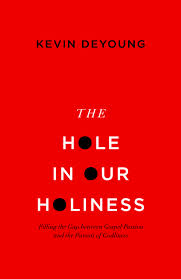Kevin DeYoung's The Hole in Our Holiness: A Review by Bill Streger
/ Kevin DeYoung’s The Hole In Our Holiness could not have come at a better time. In recent years, the Church has experienced a renewal of interest in reformed theology, and this has been a great blessing from the Lord. Rather than pursuing a ministry that eschews theological depth, many young pastors have embraced the theological tradition of the reformation with a renewed passion and vigor. Church members are laying aside doctrinal pabulum of many evangelical publishing houses and are beginning to plumb the depths of the Puritans, the Reformers, and the great pastors and evangelists who have gone before. With this rekindled embracing of reformed theology has also come a variety of understandings of how Christians should understand the call of God towards holiness. “Should preachers proclaim the Law as a pattern for Christian living? What should our emphasis be when we discuss sanctification? What does faithfulness in the pursuit of Christian maturity look like?” In the midst of a often heated conversation about holiness, God’s Law, and obedience, DeYoung offers a clear, direct response to the questions being faced by believers today.
Kevin DeYoung’s The Hole In Our Holiness could not have come at a better time. In recent years, the Church has experienced a renewal of interest in reformed theology, and this has been a great blessing from the Lord. Rather than pursuing a ministry that eschews theological depth, many young pastors have embraced the theological tradition of the reformation with a renewed passion and vigor. Church members are laying aside doctrinal pabulum of many evangelical publishing houses and are beginning to plumb the depths of the Puritans, the Reformers, and the great pastors and evangelists who have gone before. With this rekindled embracing of reformed theology has also come a variety of understandings of how Christians should understand the call of God towards holiness. “Should preachers proclaim the Law as a pattern for Christian living? What should our emphasis be when we discuss sanctification? What does faithfulness in the pursuit of Christian maturity look like?” In the midst of a often heated conversation about holiness, God’s Law, and obedience, DeYoung offers a clear, direct response to the questions being faced by believers today.
The book begins by outlining a danger DeYoung recognizes in the church at large today - we have neglected a biblical pursuit of holiness as we’ve recovered a biblical passion for the gospel. The author’s fear is “that as we rightly celebrate, and in some quarters rediscover, all that Christ has saved us from, we are giving little thought and making little effort concerning all that Christ has saved us to” (p.11). After giving several diagnostic questions by which the reader can assess the pursuit of holiness they recognize in their own lives and in the life of their church, DeYoung offers a few possible reasons for the decline in holiness he has recognized. The opening chapter closes with a summary of the main thrust of the entire book: “There is a gap between our love for the gospel and our love for godliness. This must change. It’s not pietism, legalism, or fundamentalism to take holiness seriously. It’s the way of all those who have been called to a hoy calling by a holy God” (p. 21).
DeYoung goes on to make a scriptural case that God has always intended for his people to be holy. Drawing from both the Old and New Testaments, he argues that holiness is central to our salvation, and that it is impossible to be truly saved by God’s sovereign grace and not be transformed as well. Contrary to the teaching of many who use the word “grace” as a cover for intentional sinful living, DeYoung reminds the reader that “It is the consistent and frequent teaching of the Bible that those whose lives are marked by habitual ungodliness will not go to heaven. To find acquittal from God on the last day there must be evidence flowing out of us that grace has flowed into us” (p. 26) God has commanded his people to be holy and redeemed us so that we can be holy.
Next, DeYoung addresses the topic of sanctification, the process by which God’s people are set apart to reflect his perfect character and nature. Not only does the book provide a basic explanation of the difference between justification and sanctification, it provides a helpful distinction between “definite” and “progressive” sanctification. It also refutes a number of common misunderstandings of what holiness is, clarifying that holiness is not mere rule keeping, generational imitation, generic spirituality, “finding your true self,” or the way of the world. DeYoung then paints a clear picture of what the Bible does mean when it speaks of holiness. This image is as broad as it is vivid, dealing with everything from the outworking of obedience in our physical bodies to the conforming of the Christian’s entire lifestyle to look like the example set by Christ.
The book also addresses the question of what role the Law of God should play in our lives. Many argue that as the Bible is read, studied, and preached the Christian should focus solely on the indicatives, those glorious statements of the finished work of Christ in our place and our miraculous salvation by grace through faith. While DeYoung of course affirms that these explanations of the majesty of our salvation have a central place in the life of every believer, he urges us not to leave behind the imperatives as well. We cannot simply assume that a believer who diligently focuses on the truths of the gospel will know how to live in response to it. This is why God has given us clear and direct commands to obey! In a climate in which it’s popular to label almost all direct, clear demands for obedience as legalism, DeYoung gives helpful counsel:
“Let’s not be afraid to land on law – never as the means of meriting justification, but as the proper expression of having received it. It’s not wrong for a sermon to conclude with something we have to do. It’s not inappropriate that our counseling exhort one another to obedience. Legalism is a problem in the church, but so is antinomianism… Both the indicatives and the imperatives are from God, for our good, and given in grace (p.54-56).
Another important corrective offered in the book is the reminder that it really is possible for believers to please God, and that growth in holiness is actually possible. In a (well-intentioned) attempt to remain humble and recognize the greatness of God’s holiness and the brokenness of our sin, many Christians have come to believe that they are simply unable to truly obey God and please him. This simply doesn’t match the biblical witness, and DeYoung does a commendable job in seeking to correct this misunderstanding. He offers a corrective exegesis to the often misinterpreted reference in Isaiah 64 that righteous deeds are like “filthy rags”, reminding the reader that the context of Isaiah 64 makes clear “the Bible’s assumption, and expectation, that righteousness is possible” (p.69). He also argues convincingly that there are indeed varying degrees of sin in the eyes of the Lord, and that even though the elect are secure as his adopted sons and daughters we can still please and displease him by our level of obedience.
DeYoung spends several chapters unpacking two important doctrines that fuel a believer’s pursuit of holiness. He addresses the role of the Holy Spirit, indwelling believers and empowering us to put forth “gospel-driven, faith-fueled effort” towards our growth in godliness. Apart from the empowerment of God’s Spirit, the Christian would have no hope of making progress in the battle against sin and for righteousness, but with the Holy Spirit indwelling they can be confident that God is pleased with their effort and the battle will ultimately be won. In addition, the author devotes an entire chapter to exploring the role union with Christ plays in our salvation. While this chapter was thoroughly saturated in scripture and generally helpful, it didn’t seem to fit as well as most of the other chapters. It felt a bit like it was added in after the book, having first been written in another context and then repurposed for the sake of this book. This is a minor criticism, however, and it is an edifying and needed topic, too often unknown to many evangelicals.
The most practical chapters come towards the end of the book. DeYoung includes a thorough examination of how believers can pursue holiness in the area of sexuality. He provides direct advice for believers who are struggling to maintain sexual purity in the midst of dating relationships. One of the most helpful guidelines he gives to young couples is to remember that their primary relationship to one another before marriage is that of brother and sister in Christ, and they should act with one another as they would a sibling. While much of his instruction is not popular in today’s culture, it is thoroughly biblical and honors the standard of purity that the Lord has given his disciples.
The book concludes with a chapter calling the readers to purse ever-increasing communion with Christ. This intimacy with the Savior is essential for growth in holiness, and DeYoung gives four practices that fuel a believer’s affections for Christ: prayer, reading of scripture, fellowship with other Christians, and partaking of the sacraments. It was refreshing to read this section, as DeYoung chose to root his counsel in the historic reforemed tradition. It has become increasingly common for believers to look for extraordinary experiences and mystical encounters with God. DeYoung instead points believers to the ordinary means of grace – the paths God himself has ordained his people are to walk in their journey of communion with him.
DeYoung has given the church a great gift in this book. It is concise, able to be read in a concentrated period of time. It is clear and accessible, written with an interested layman in mind. It is biblical, not only in that it makes its arguments following the general teaching of scripture but also providing copious amounts of scripture throughout the book – giving testimony to the Bible’s teaching on the nature of and necessity for holiness. It is charitable, engaging with differing viewpoints from within the Body of Christ with the respect and dignity that brothers and sisters in Christ deserve. It is practical, providing a theological framework for holiness, concrete examples of what holiness looks like in everyday life, and instructions and guidance for how believers might pursue holiness themselves. It is pastoral, written with gentle directness and candor about the importance of holiness in the life of a reader. It is a book that this reviewer has recommended and will continue to recommend to members of his own congregation who are seeking to grow in their understanding of how God calls his people to live in light of their salvation in Christ.
~ Bill Streger, Student
Reformed Baptist Seminary











